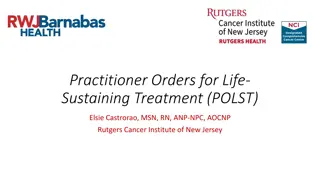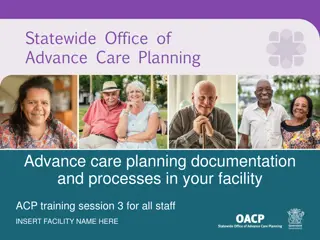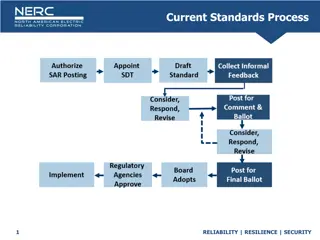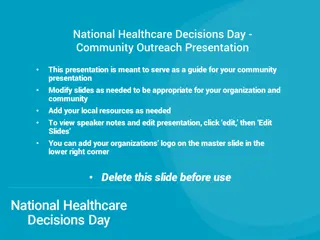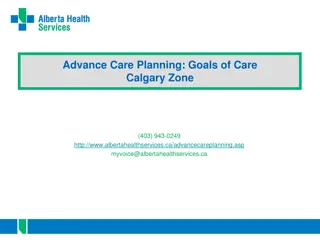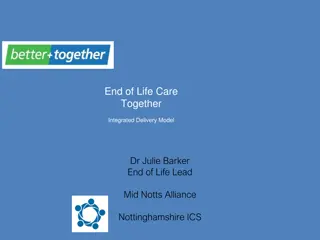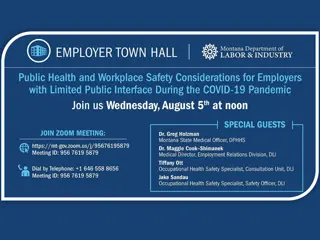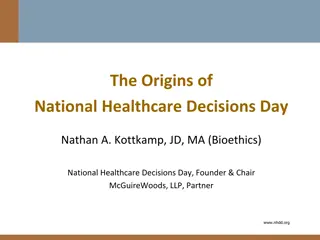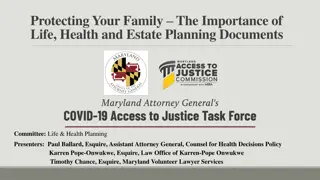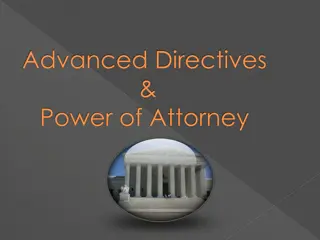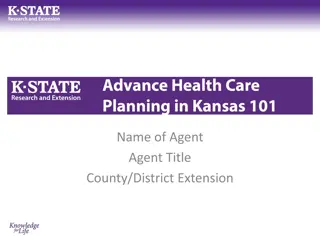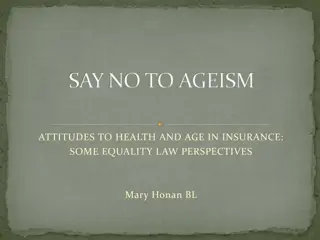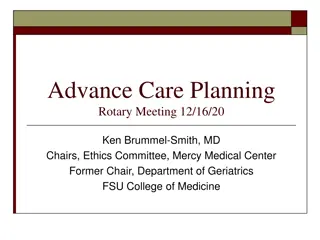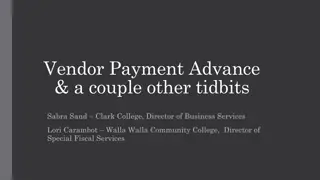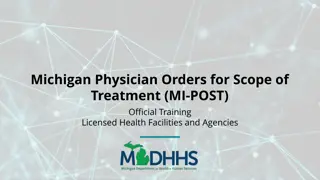
Understanding Advance Directives and Healthcare Decision Making in Kansas
Learn about advance directives, including Durable Power of Attorney for Health Care, Living Will, and Do Not Resuscitate orders in Kansas. Discover how to get, notarize, and share advance directive forms, as well as address common FAQs related to healthcare decision-making.
Download Presentation

Please find below an Image/Link to download the presentation.
The content on the website is provided AS IS for your information and personal use only. It may not be sold, licensed, or shared on other websites without obtaining consent from the author. Download presentation by click this link. If you encounter any issues during the download, it is possible that the publisher has removed the file from their server.
E N D
Presentation Transcript
Healthcare Decisions Day April 16 By Jenny Johnston
NHDD https://www.youtube.com/watch?v=Bar0qZTUGdw
1.What are the three kinds of Advance Directives in Kansas? Durable Power of Attorney for Health Care (DPOA-HC), Living Will and Do Not Resuscitate. 2.How is the durable power of attorney for health care (DPOA-HC) different from a general power of attorney? The durable power of attorney for health care (DPOA-HC) covers ONLY health care decisions. The general durable power of attorney covers financial matters and property decisions. 3.May I choose the same agent for financial and health care decisions? Yes, you may choose the same person to be your DPOA for health care and finances. You must make sure to use separate documents for each DPOA position. Your health care facilities and physicians will only need the DPOA for Health Care documents. 4. Where do I get the advance directive forms? In Kansas, you may go to the website: wichitamedicalresearch.org Click on menu item titled Kansas Advance Directives, then locate the form you wish to print. You may also request forms at any admissions office of any local hospital. If you need another state s forms, go to website www.nhpco.org and click on advance directives and select specific state s forms. 5.I have filled out my Advance Directive forms. Where do I get the forms notarized? Notary is available at local Kroger/Dillon s stores or your local bank or hospital. Wichita Medical Research and Education Foundation also provide notary service at no cost, but call for an appointment first. 6.Do I get the forms witnessed or notarized? Is it better to have my forms notarized or witnessed? You may have the forms witnessed OR notarized. Some states require notary. Kansas does not require notary. 7.Who can witness my signature? Two persons who recognize that you are the person you say you are. They do not have to understand the form or what you are signing. They are only recognizing you and your signature. 8.Are my Advance Directive forms honored in other states when I travel? Yes. All 50 states have advance directives. Advance directives travel with you and are honored in all states. FAQS- Advance Directives
1.I have filled out my Advance Directive forms. What do I do with them? When you have signed the forms, make at least five or more copies of your documents and give them to your DPOA-HC (agents), your physicians, your lawyer, spiritual leader or anyone else who may be involved with your health care. Make sure your agent(s), family members and friends know where your documents are kept. Please keep your originals in a safe place. Keep one copy where it is easy to find and make more copies if needed. A copy of these documents has the same effect as the original. It is your responsibility to have a copy ready when it is needed. Take a copy with you when you go into a hospital, nursing home, hospice or other care facility. 2.What if my family disagrees with the DPOA-HC I have chosen? What if they want something different from my wishes? The physician is required to recognize the durable power of attorney for health care as the legal decision maker for the patient. If there is discord/disagreement about what you wanted and what the family members think you wanted, then the physician will continue to speak with the DPOA-HC and family members until an agreement is made about your wishes. Understand the chosen DPOA-HC (agents) are the only ones with the legal right to make decisions for you. It is important that you discuss your wishes and values now with your family so they will know what you want done at the end of life. FAQS Continued 3.What is a HIPPA release? Is a HIPPA release an advance directive? HIPPA stands for Health Insurance Portability and Accountability Act established in 1996 to protect patient s health care information. No, a HIPPA release is not an advance directive. In the HIPPA release document, you can designate those whom may receive your health care information from the physician or health care professionals. These persons may or may not be your DPOA-HC. 4.Where can I get a HIPPA Release form? You can get a HIPPA release form from the staff at the office of your health care provider (physician or clinic s office).
Choosing Your Durable Power of Attorney for Health Care (DPOA-HC) and other questions re:DPOA-HC 1.What are some guidelines for choosing my agent (DPOA-HC)? Choose someone you trust to listen to your wishes, ask questions of the health care staff, and make decisions that you would want made. You will need to share health care information with this person(s) to assist them in making decisions if you were unable to make them for yourself. 2.My son lives in Canada; can he be my DPOA for Health Care? Yes, your son in Canada can be your DPOA-HC. Your DPOA-HC does not have to live in the U.S.A. or near you. The important thing is that the person be available by phone to discuss decisions when they need to be made. 3.I am my mother s DPOA for Health Care. May I sign her DNR? No, you may not sign a DNR form for your mother or anyone else. In Kansas, the Do Not Resuscitate (DNR) form is a directive which means the DNR Directive may be signed by the patient only and the patient s physician. IF your mother loses capacity (ability to make decisions for herself), and the physician or you feel a DNR status is appropriate, after discussion, when agreed upon by patient decision makers(s) and the attending physician, the physician can sign a DNR ORDER on the chart. IF the patient is at home, a DNR order can be written on a prescription pad by the attending physician and posted in the home. 4.I have my daughter listed as my agent on my DPOA for health care and have changed my mind and want it to be my son. Can I just mark out her name and add his, or do I need to fill out new forms? No. You need to fill out new forms. The DPOA-HC form is a legal form and it is not recommended to mark things out on a legal form. If you have capacity, you can fill out new forms. IF you lose capacity, you cannot change the form and no one can change the form for you or fill out a new form for you. Be sure to communicate with your children why you are changing the DPOA-HC so there is less chance of disagreement about decisions. 5.How many people may I choose for my DPOA-HC? The WMREF form has three (3) spaces for agents names and information. You may choose 1 or more. Choose individuals whom you believe will honor your wishes, be available and be assertive in representing your health care wishes. 6.Can my minor child be my DPOA for Health Care? No. The statute states that the DPOA-HC must be 18 years or older. Consult an attorney if you want further information. 7.My only living relative is my daughter who is mentally handicapped. May I appoint her as my DPOA? Your DPOA-HC will need to make decisions for you when you are unable to do so. Your DPOA Specific Questions
1.What is a Living Will? A Living Will is a declaration that is applicable to situations where you would have an incurable injury, disease, or illness certified to be a terminal condition by two physicians who have examined you. Each of the 50 states of the U.S.A. has this advance directive, Living Will. This document applies to terminal conditions where patients are expected to die and where the application of life-sustaining procedures would serve only to artificially prolong the dying process. Many feel the Living Will helps to identify someone s wishes about end of life care, but it is not specific. 2.What is the difference between a DPOA-HC and a Living Will? A DPOA-HC designates whom you want to make health care decisions for you when you are not able to make decisions for yourself. A Living Will is a document applied to terminal conditions and it is for you to sign about your desire that my dying shall not be artificially prolonged if you have an incurable injury, disease or illness The Living Will does not have the names of your DPOA-HC on the form. You need the DPOA-HC form for many different situations other than terminal condition when you cannot make decisions for yourself and it designates your decision makers. Living Will
1.What does DNR mean? DNR means DO NOT RESUSCITATE. CPR is an abbreviation for cardio-pulmonary resuscitation (heart and lung resuscitation) and DNR means no CPR will be done. No chest compressions, no artificial breathing will be done if the person s heart stops and/or breathing stops. 2.May I sign a DNR for my relative? NO. In Kansas, the DNR is a directive signed by the patient only. If the patient has lost capacity or cannot sign the DNR Directive, you may talk to the physician and if appropriate, the physician can sign a DNR Order on the order sheet of the health care facility. If the patient is at home, the physician can sign a DNR Order on a prescription pad and this is posted in the home. 3.My father cannot sign documents (he is not mentally of capacity) and needs a DNR. What can I do to get a DNR in place? Ask the attending physician (the private doctor for your father, or medical director of the nursing home, or the physician caring for your father) about your father s need for a DNR. The physician can sign a DNR ORDER if appropriate and agreed upon. 4.I am the guardian for a relative in long term care. My relative no longer has capacity to make decisions for himself. How do I get a Do Not Resuscitate Order in place? With guardianship, you must talk to the attending physician who completes a form required by the court system. You should talk to your patient s case manager and your attorney and ask about the steps to proceed to court to obtain a DNR for your relative. A judge will have to decide if the DNR is necessary. Sometimes this may take several weeks. 5.Does a DNR require a physician s signature? Yes, in order to be valid and honored, a physician has to sign and date the DNR. 6.What is a Physician s Order? A Physician s order is a written order about the care of the patient/resident. These orders are written in the chart at a health care facility. A Do Not Resuscitate order can also be written on a prescription pad and this paper is then posted in the residence of the patient. 7. Will EMS (Emergency Medical Service) honor a DNR bracelet that signifies the patient does not want to be resuscitated? YES. For a patient/resident to obtain a DNR bracelet, you must send in the DNR Directive or Order signed by a physician to the appropriate company you are buying the bracelet from. A DNR bracelet can be worn at all times and you do not have to have the DNR paper with you. DNR
1.What is a TPOPP (Transportable Physician Order for Patient Preferences) form? A TPOPP form is a physician order set that outlines the patient s wishes for end of life care or specific wishes for care. A TPOPP form does not replace Advance Directives, but is more specific about CPR, medical interventions and treatment goals, medically administered nutrition. This form can be signed by the patient/resident/agent/DPOA-HC/parent of a minor, or a legal guardian. 2.Who may use a TPOPP form? Apatient or resident of a health care facility who is expected to die in the next year may use a TPOPP form, or someone who wants to clarify the end of life care for their loved one. The TPOPP form will clarify patient preferences and medical indications for treatment more clearly than advance directives. 3.Where do I get a TPOPP form? You may obtain a TPOPP form from your physician. For more information about TPOPP, go to www.TPOPPWichita.org or watch the YouTube segment on TPOPP: https://www.youtube.com/watch?v=xHl7q69131M 4.If I have Advance Directive forms, do I need a TPOPP form? If you have a terminal condition, or advanced chronic illness (COPD, heart disease, diabetes, etc.) and your physician believes you may die in the next year, a TPOPP form is appropriate for you to complete. Completing a TPOPP form is always voluntary and maybe part of an individual s advance care planning process, but it does not take the place of the DPOA-HC form, or living will. (The DPOA-HC form is for anyone and could be for making decisions for someone who will recover from an injury or illness.) The TPOPP form is NOT a Do Not Resuscitate (DNR) Directive but it is a doctor s order set and if part A signifies Do Not Attempt Resuscitation, CPR should not be done. 5.If I have a TPOPP form, do I need Advance Directive forms? YES. A DPOA-HC form is not always used at the end of life. It could be used for making decisions for someone who will recover, but cannot make decisions for themselves for a temporary period of time. You still need a DPOA-HC form so that you have someone to make decisions for you IF you have lost capacity. The DPOA-HC can sign the TPOPP form on section D as the recognized decision maker. If you do not have anyone to make decisions for you, the TPOPP form filled out by you with your physician will help clarify your decisions about end of life care. TPOPP- Transportable Physician Order for Patient Preferences
Myths If I name a health care proxy, I give up the right to make my own decisions. Naming a health care proxy or agent does not take away any of your authority. You always have the right, while you are still competent, to override the decision of your proxy or revoke the directive. If you do not name a proxy or agent, the likelihood of needing a court appointed guardian grows greater, especially if there is disagreement regarding your treatment among your family and doctors.
Have the Conversation Reflect on your personal experiences, values, desires and preferences. Talk to the person you are considering as your Agent. Appoint the person who will speak for you when you cannot speak for yourself using the Durable Power of Attorney for Healthcare Decisions form. Act by sharing your decisions about your healthcare preferences with family, friends, healthcare providers, clergy or attorneys if desired and reviewing your preferences on a regular basis. You will also find information to share with your Agent to help understand what you are asking of him or her and how to act on your behalf. For the person who will be your Agent, you will !nd information that will help your Agent know: When they will have the power to act as your Agent, How he or she can be your voice when you cannot speak for yourself, and What your Agent needs to know about you, your values and your current health status.
In Response to COVID-19 https://theconversationproject.org/wp- content/uploads/2020/04/tcpcovid19guide.pdf
Conversation Starter Kit https://theconversationproject.org/wp- content/uploads/2017/02/ConversationProject-ConvoStarterKit- English.pdf

